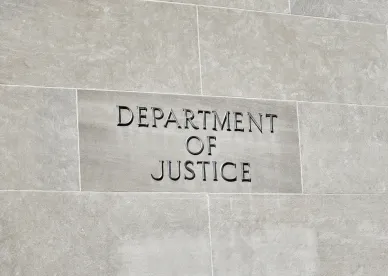WHAT HAPPENED
-
On back-to-back days this month, defendants charged and prosecuted by the US Department of Justice’s Antitrust Division (the DOJ) were acquitted on all Sherman Act charges in first-of-their-kind criminal antitrust trials involving labor markets.
-
On April 14, 2022, in United States v. Jindal, a federal jury in the US District Court for the Eastern District of Texas found two defendants not guilty of violating the Sherman Act by agreeing with competitors on wages they would pay their employees. The jury found one of the defendants guilty of obstructing a Federal Trade Commission (FTC) investigation by making false and misleading statements to the FTC and concealing information.
-
The following day, in United States v. DaVita, Inc., a Colorado federal jury acquitted DaVita, Inc. and its former chief executive on all counts of violating the antitrust laws by entering into non-solicit agreements with other employers.
-
The Jindal case was the DOJ’s first attempt to criminally prosecute so-called alleged “wage-fixing” agreements. Similarly, the DaVita case was DOJ’s first criminal trial targeting alleged no-poach or non-solicit agreements between employers.
-
Historically, the DOJ pursued enforcement of alleged anticompetitive labor market practices in the civil context rather than criminally. But in 2016, the DOJ did an about-face and warned employers in its 2016 Antitrust Guidance for Human Resource Professionals that it intended to proceed criminally against “naked wage-fixing or no-poach agreements” between horizontal competitors in labor markets. The DOJ’s efforts to investigate and criminally prosecute such agreements under this new policy started ramping up publicly in late 2020.
-
The DOJ filed an indictment against Jindal in December 2020 and a superseding indictment against Jindal and another defendant in April 2021. The DOJ alleged that the defendants participated in a conspiracy to lower the rates paid to physical therapists and physical therapist assistants in north Texas. A few months later, in July 2021, the DOJ filed an indictment against DaVita and its former CEO, alleging that they conspired with competitors in the healthcare industry not to solicit each other’s employees. The DOJ returned a superseding indictment in November 2021.
-
In both cases, the district courts denied the defendants’ motions to dismiss. The Jindal court held—for the first time ever—that an alleged wage-fixing conspiracy could constitute a per se criminal violation of the Sherman Act. Similarly, the DaVita court held that no-poach and non-solicit agreements could constitute per se violations—but only if the alleged naked agreements allocate the employment market. The DaVita court refused to announce a blanket rule that all no-poach or non-solicit agreements are subject to per se
-
Despite these rulings, the juries in both cases ultimately acquitted the defendants of all antitrust charges brought by the DOJ.
WHAT’S NEXT
-
The DOJ remains committed to investigating and criminally prosecuting wage-fixing and no-poach agreements despite these early setbacks. Since the Jindal indictment in December 2020, the DOJ has indicted numerous defendants for alleged labor-market offenses. Most recently, in January 2022, the DOJ indicted four managers of home healthcare agencies for both wage-fixing and market allocation. Where possible, the DOJ will also look to add obstruction charges, as in Jindal, even where the defendant allegedly obstructed another agency’s investigation.
-
As one DOJ official said following the Jindal verdict, “In no way should the verdict today be taken as a referendum on the Antitrust Division’s commitment to prosecuting labor market collusion, or on our ability to prove these crimes at trial.” DOJ officials also made clear at the recent annual ABA Antitrust Law Spring Meeting that the DOJ remains intent on pursuing alleged no-poach and wage-fixing agreements as criminal violations and views labor market issues as a priority.
-
The DOJ will rely on the precedents set in the Jindal and DaVita motion to dismiss rulings in other cases moving forward. However, the acquittals in these cases indicate that the DOJ may face skeptical juries in criminally prosecuting labor market cases. Jindal and DaVita suggest that juries view labor markets differently than markets for goods and services and may want to see proof of actual harm to employees to convict.
-
With the DOJ determined to continue investigating and prosecuting alleged wage-fixing and no-poach agreements, companies should take care to understand these issues and incorporate them into their compliance programs.
-
Companies and executives also must take care to be fully truthful with investigating government agencies, whether in interviews or other disclosures and submissions. As the Jindal case shows, the DOJ can use a defendant’s failure to be truthful in the context of a civil investigation as the basis for adding obstruction charges on the criminal front.



 />i
/>i

